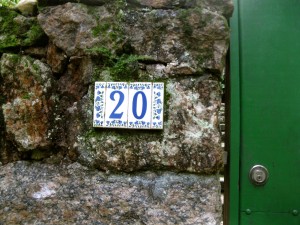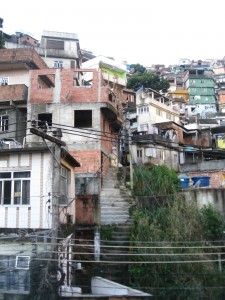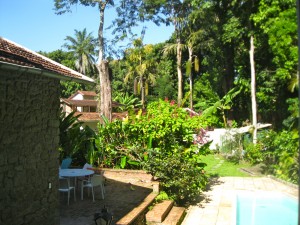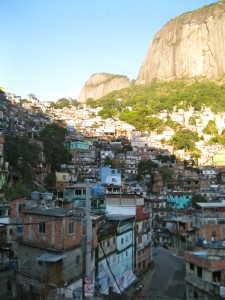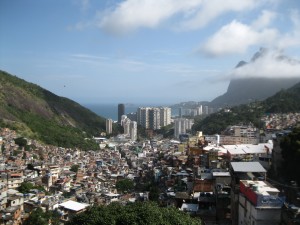Saudações do Brasil! I arrived last week to Rio de Janeiro, where I have joined the team at Pipa –an accelerator program for social entrepreneurs– with the task to help them develop a system to measure, assess, and manage impact.
The first official week of my placement got off to a bit of a slow start; the Pope was in town for World Youth Day, and to celebrate his visit (and avoid the outrageous extra traffic), most of the city, including my new office, put normal operations on hold for the week.
Meanwhile, with two home office days followed by two feriados (public holidays), I spent my free time away from the office getting to know my new home: Rocinha, Rio’s largest and most densely populated favela.
For my placement with Pipa, I work out of the beautiful Casa 20, a mansion in São Conrado. One of the more affluent neighborhoods of Rio, São Conrado offers a breathtaking and relaxing environment that appeals to tourists and upper class citizens with its luxury golf course and scenic paragliding points. The Pipa mansion shares the same tranquil beauty. Colorful, spacious, and surrounded by lush green, Casa 20 gives a lively and fresh atmosphere, providing what seems to be a perfect space to inspire creativity and innovation.
So how, then, did I end up in one of Brazil’s infamous urban slums? Why did I leave behind the serenity in the spaciousness of São Conrado to find myself crowding into the winding maze of already narrow streets and stairs that appear even smaller under that buildings stacked story-after-story? Why did I give up the peaceful atmosphere to find a home in a neighborhood known for its history of violence and crime?
It all started when I was looking at apartments for rent on Airbnb and I came across the opportunity to do a homestay with a family. The ad was posted by one of FMS’s alums, social entrepreneur himself Elliot Rosenberg, who runs Favela Experience– a community tourism agency that helps direct tourism towards developing the community. Upon discovering a fellow scout, any doubts or second thoughts that I otherwise might have had about staying in the favela were completely distinguished. And I immediately started to get excited about the opportunity to explore an area that before had seemed so off limits.
For me, this is not the first time that I have found myself making home in a neighborhood where poverty is present in the streets, where electricity comes and go, and where water is never a guarantee. In fact, when I have traveled previously –whether to rural Honduras or the outskirts of urban Morocco– staying in lesser developed communities has tended to be my preference. But this time, something about the experience has been different; and this time, I continue to be surprised.
What has been so shocking to me is the striking array of contrasts so visible everywhere I go: extreme luxury right next to extreme poverty, metropolitan skyscrapers between steep mountains, etc., and all in walking distance. From my home in the favela, I can walk to the Fashion Mall, one of Rio’s most renowned luxury commercial centers. Five more minutes and I am at the beach. Another five minutes to the other side and I am back in another favela. People live in and out of the face of luxury and poverty on a daily basis. Beach or city center, I see contrasts everywhere I go; but I think these contrasts will prove to be interesting signs of opportunities for innovation and social entrepreneurship. From mansion to favela, the quest begins!

